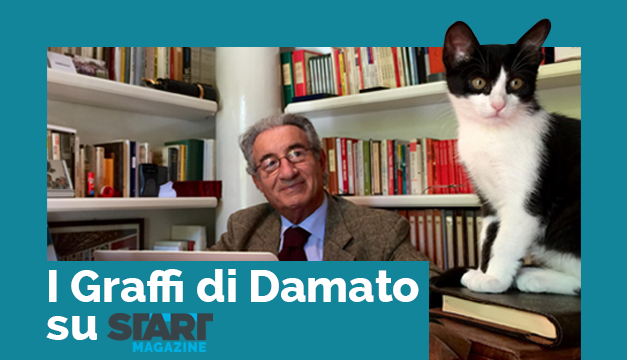What the center-right will (not) do to the government

Comments and analysis on the scenario of a center-right victory in the elections on 25 September. The Scratches of Damato
Although less shouted than others among all the Italian newspapers, and certainly not comparable to that of Piero Sansonetti on the Riformista in explicit favor of "Giorgia", I fear that it was the title of Avvenire, the newspaper of the Italian bishops, to the secretary of the Democratic Party Enrico Letta was embarrassed about the much applauded speech of the Prime Minister at the Meeting of Communion and Liberation in Rimini. I will have made, as a good faithful, the sign of the cross.
That "Draghi: Italy will succeed with any government" was certainly not the other morning – nor certainly and honestly could it be – of the electoral campaign of the secretary of the Pd-ex Dc, and not only ex PCI, based for choice of the same interested party on the opposition not only and not so much to the center-right as to Giorgia Meloni. With which it is no coincidence that Enrico Letta attempted the most coveted direct television confrontation close to the polls, complaining of the "Byzantine" rejection of the supervisory authority, sensitive to the protests of the other competitors.
The newspaper of the Italian bishops, which, while not mentioning it, I repeat, also extended the confident expectation of its successor by the Prime Minister to Meloni, contradicted a Letta committed to stopping an opponent from whom it fears upset even on the very delicate level of foreign policy for his relations – for example – with the Hungarian Orban, who likes or suits Putin so much.
Foreign policy has assumed a centrality in the electoral campaign, an importance, call it as times, gradually increasing, beyond or in spite of the many focuses on economic, social, climatic issues, from the daily "pills" of Silvio Berlusconi to the shots and to the numbers of Matteo Salvini, from the Bertinottate by Giuseppe Conte to the confetti by Luigi De Magistris and to the fatwas of a Carlo Calenda really allied with Matteo Renzi. Younger people are lucky enough not to be able to remember it, but sometimes the older ones, who are really elderly, seem to relive or listen to the words and themes of the 1948 election campaign: when someone, in the imagination of propaganda, could risk being seen in the urn from Stalin as this time from Putin, also housed in the Kremlin. Then the teenager Silvio Berlusconi pasted the DC election posters on the walls of Milan risking the blows of the communist attacks, which must also have remained on his goiter for this reason, even now that they are no longer there, or they are no longer called that.
It is precisely based on the Draghian legacy of foreign policy, of which the outgoing President of the Council always speaks with a force equal to sobriety, with a clarity that never lends itself to the misunderstandings or double readings so frequent in Italian politics, that Dario Di Vico in the Corriere della Sera he wanted in some way to dispel the doubts, fears and anything else expressed the day before, in the same newspaper, by the former director Paolo Mieli, alarmed, in particular, by the Roman "climate" felt in Moscow with satisfaction by Dmitry Suslov.
Given Draghi's "heavy legacy" and in the belief – as you prefer – of Meloni's electoral victory accredited by the polls, Di Vico asked us: "It is credible that a center-right majority can reverse to U and position our country, if not alongside Russia, at least in a position of feigned neutrality by breaking the agreement between the European partners? And that the same majority can also cancel the decisions made by the current government regarding the diversification of supplies and the launch of new regasifiers in the delicate field of energy dependence? ”. Even some brothers from Italy do not seem to like it, and not just the grillini.
"The answer is no," Di Vico wrote. That so, without waiting for the "political scientists" invoked at the opening of his speech to explain to him the "oxymoron" of Rimini – where the CLs had applauded Mario Draghi as much as the day before Giorgia Meloni, back from an opposition to all successive governments in the legislature that was finally interrupted – it responded by itself also on that side. The Rimini public clearly felt the continuity of action between Draghi and "anyone", even on the right, should succeed him due to the "forced choices" of foreign policy, adopted by Di Vico himself as the title of his editorial. Enrico Letta, although consoled later by the embrace with Prodi in an electoral demonstration in Bologna, has perhaps really turned in bed to the other side, as cartoonist Stefano Rolli imagined him mercilessly on the front page of yesterday's 19th Century . But will it be enough for him to get out of the difficulties in which he objectively finds himself? Or he put himself, as someone already grumbles in his party, behind a unity, as usual, on the front in the electoral campaign.
This is a machine translation from Italian language of a post published on Start Magazine at the URL https://www.startmag.it/mondo/che-cosa-non-fara-il-centrodestra-al-governo/ on Sat, 27 Aug 2022 08:06:31 +0000.
